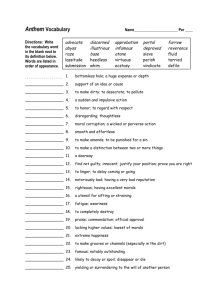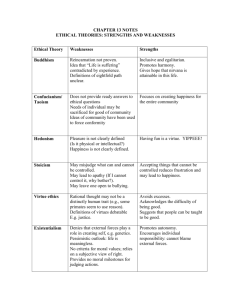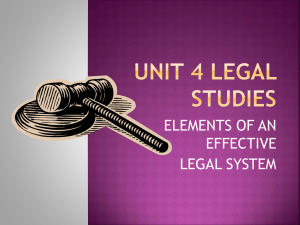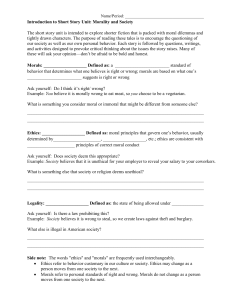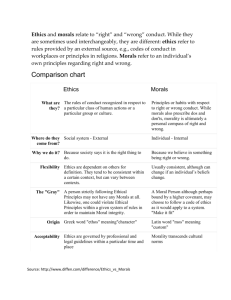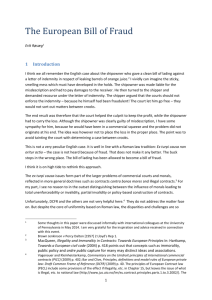Ethics Test 1: Notes
advertisement
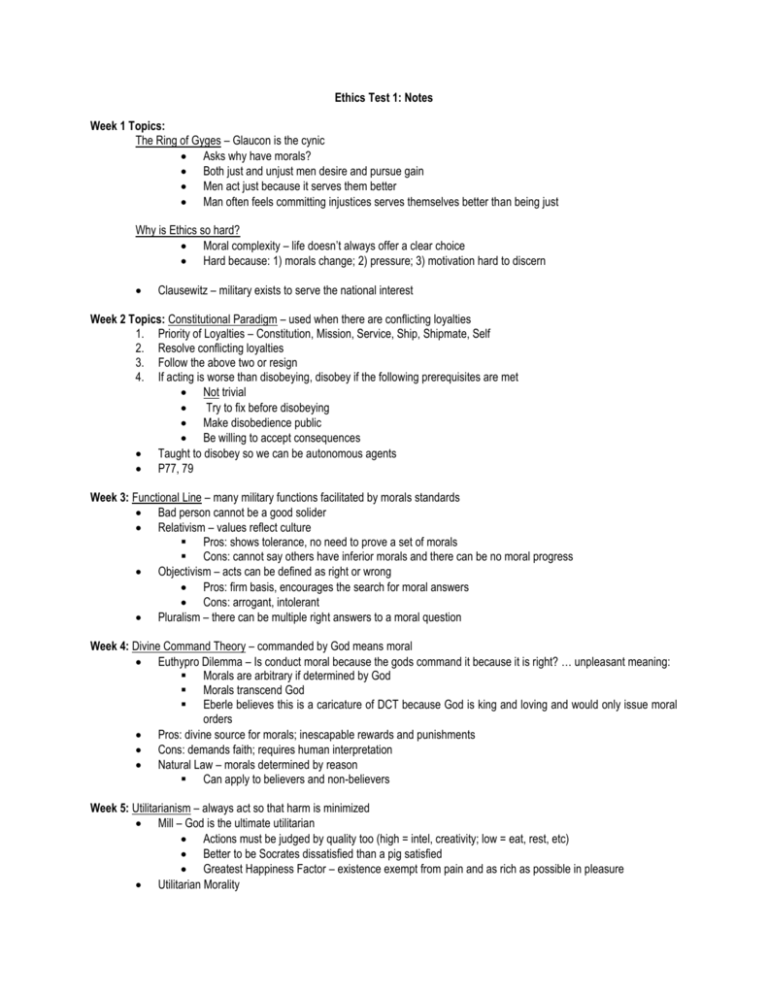
Ethics Test 1: Notes Week 1 Topics: The Ring of Gyges – Glaucon is the cynic Asks why have morals? Both just and unjust men desire and pursue gain Men act just because it serves them better Man often feels committing injustices serves themselves better than being just Why is Ethics so hard? Moral complexity – life doesn’t always offer a clear choice Hard because: 1) morals change; 2) pressure; 3) motivation hard to discern Clausewitz – military exists to serve the national interest Week 2 Topics: Constitutional Paradigm – used when there are conflicting loyalties 1. Priority of Loyalties – Constitution, Mission, Service, Ship, Shipmate, Self 2. Resolve conflicting loyalties 3. Follow the above two or resign 4. If acting is worse than disobeying, disobey if the following prerequisites are met Not trivial Try to fix before disobeying Make disobedience public Be willing to accept consequences Taught to disobey so we can be autonomous agents P77, 79 Week 3: Functional Line – many military functions facilitated by morals standards Bad person cannot be a good solider Relativism – values reflect culture Pros: shows tolerance, no need to prove a set of morals Cons: cannot say others have inferior morals and there can be no moral progress Objectivism – acts can be defined as right or wrong Pros: firm basis, encourages the search for moral answers Cons: arrogant, intolerant Pluralism – there can be multiple right answers to a moral question Week 4: Divine Command Theory – commanded by God means moral Euthypro Dilemma – Is conduct moral because the gods command it because it is right? … unpleasant meaning: Morals are arbitrary if determined by God Morals transcend God Eberle believes this is a caricature of DCT because God is king and loving and would only issue moral orders Pros: divine source for morals; inescapable rewards and punishments Cons: demands faith; requires human interpretation Natural Law – morals determined by reason Can apply to believers and non-believers Week 5: Utilitarianism – always act so that harm is minimized Mill – God is the ultimate utilitarian Actions must be judged by quality too (high = intel, creativity; low = eat, rest, etc) Better to be Socrates dissatisfied than a pig satisfied Greatest Happiness Factor – existence exempt from pain and as rich as possible in pleasure Utilitarian Morality Laws should put happiness of the individual in harmony with the whole Education should establish an association between happiness and good for the whole Motivation unimportant Consequentialist – teleological aspect – rightness determined by account Utility – hedonic – pleasure is the only good, pain is the only evil Types of Utilitarianism Act – only right if an act causes as much good as alternatives (requires you to evaluate every act) Rule – act right only if required by a rule (must still yield greatest utility) Action Guiding Rules Remainder rule – when no other role applies, use your best judgment Conflict-resolving rules Utility maximizing rules (must always be followed) Negative Responsibility – you’re responsible for actions you take and don’t take Cons – unlimited scope but has limited precision (too much info required) Respect for Life – not specifically valued; can be lost for the greater good Week 6: Kant – actions moral only if done for the sake of duty Formula of Autonomy – to be free, an individual must act on their own, not for incentives Duty for duty’s sake Categorical Imperative – don’t do something that you don’t want everyone to do Formula of Universal Law – act on universal obligations before personal desires Formula of Humanity as an End Itself – don’t use others for your own ends (don’t manipulate or coerce) Kingdom of Ends – act like everyone is a lawgiver and citizen Inaction can be immoral too An act does not have to be the best possible act to be moral Cons – smaller scope (only assesses intentional acts; applies to individuals and groups with rules); focuses on maxims more than results Respect for Life – people aren’t ends This does not mean they will preserve life though (Kant can be just without providing the best healthcare) Week 7: Aristotle – the best possible act is a mean between the extremes of deficiency and excess Eudaimonia – human flourishing or excellence Achieved through a mean o Evil is just missing the mark o Some actions have no mean (murder, adultery, rape) Virtue – excellence found through a mean Habituation is needed to develop character True courage – citizen solider Lower courages: experience, passion, overconfident people, ignorant people Categories of People Virtuous – understand virtue and life a virtuous life Weak-willed – understand virtue but have trouble controlling their desires Wicked – understand virtue and refuse to seek it Innocents – incapable of understanding virtue


